In an era defined by technological innovation, our living spaces are undergoing a profound transformation. The concept of the smart home has evolved from a futuristic idea to a tangible reality, revolutionizing the way we interact with our living environments. This article delves into the rise of the smart home, exploring how technology is reshaping our homes and fundamentally changing the way we live.
The Genesis of Smart Homes:
The roots of smart homes can be traced back to the concept of home automation, which aims to simplify and enhance various household tasks. However, with the advent of advanced technologies like the Internet of Things (IoT) and artificial intelligence (AI), smart homes have evolved into integrated ecosystems that offer unparalleled convenience and efficiency.
Integration of IoT Devices:
Central to the concept of smart homes is the integration of IoT devices. These interconnected devices, from smart thermostats to voice assistants, communicate with each other to create a cohesive and responsive living environment.
Seamless Connectivity and Control:
Smart homes offer the luxury of seamless connectivity and control. Through smartphone apps or voice commands, homeowners can remotely monitor and manage various aspects of their homes, such as lighting, security, and appliances.
Voice-Activated Assistants:
Virtual assistants like Amazon’s Alexa, Google Assistant, and Apple’s Siri have become integral parts of smart homes. These voice-activated assistants respond to verbal commands, enabling homeowners to control devices, play music, and even answer queries without lifting a finger.
Intelligent Energy Management:
Smart homes are redefining energy management. Smart thermostats, energy-efficient lighting, and smart plugs enable homeowners to optimize energy consumption and reduce utility bills by remotely controlling and scheduling devices.
Enhanced Security and Surveillance:
Technology has elevated home security to new heights. Smart locks, doorbell cameras, and motion sensors provide homeowners with real-time alerts and the ability to monitor their homes remotely, ensuring peace of mind even when away.
Personalized Home Entertainment:
Smart homes offer personalized home entertainment experiences. Homeowners can stream content on-demand, create customized playlists, and adjust lighting and ambiance to match their preferences—all with the touch of a button.
Health and Wellness Monitoring:
Health and wellness are increasingly integrated into smart homes. Wearable devices and connected health monitors can transmit data to smart home systems, allowing homeowners to track their well-being and receive personalized insights.
Automation and Routine Optimization:
Smart homes excel in automation and routine optimization. Homeowners can create schedules that adjust lighting, temperature, and other settings based on their daily routines, enhancing comfort and efficiency.
Sustainable Living through Automation:
The automation capabilities of smart homes contribute to sustainable living. Energy-efficient appliances, intelligent water management systems, and smart irrigation solutions reduce environmental impact while conserving resources.
Data-Driven Insights:
Smart homes generate a wealth of data. Analyzing this data provides homeowners with insights into their living patterns, energy usage, and preferences, enabling them to make informed decisions for a better lifestyle.
Accessibility and Inclusivity:
Smart homes enhance accessibility and inclusivity. Voice-activated controls, remote management, and assistive technologies empower individuals with disabilities to independently manage their living environments.
Challenges and Privacy Considerations:
While the benefits are undeniable, the rise of smart homes also raises concerns about data privacy and cybersecurity. Homeowners must be vigilant about protecting their personal information and securing their smart devices.
Future Prospects:
The trajectory of smart homes points toward even greater integration, innovation, and connectivity. As technology continues to evolve, we can expect more sophisticated AI-driven systems, increased interoperability among devices, and a seamless integration with smart cities.
Smart Appliances and Connectivity:
Smart appliances, such as refrigerators, ovens, and washing machines, are becoming interconnected through the Internet of Things. These appliances can be controlled remotely, enabling homeowners to start cooking, adjust temperatures, or initiate laundry cycles from their smartphones.
Automated Lighting and Ambiance:
Smart lighting systems allow homeowners to adjust the brightness, color, and ambiance of their living spaces with ease. Automated lighting schedules can mimic natural light patterns, promoting better sleep and energy efficiency.
Enhanced Home Automation Platforms:
Home automation platforms, like Apple’s HomeKit, Google’s Nest, and Samsung’s SmartThings, offer centralized control for various smart devices. These platforms create a unified ecosystem where devices can communicate and collaborate seamlessly.
Integration of Augmented Reality (AR):
Augmented reality is entering the smart home arena. Homeowners can use AR applications to visualize how furniture and décor items would look in their spaces before making purchase decisions, enhancing interior design choices.
Adaptive Learning and AI Insights:
Artificial intelligence is playing a pivotal role in smart homes. AI algorithms learn from homeowners’ preferences and behaviors, adapting devices and settings to match their lifestyle. These insights lead to more personalized and intuitive living experiences.
Smart Gardening and Outdoor Management:
Smart home technology is extending to outdoor spaces. Automated irrigation systems, weather-sensitive sensors, and smart gardening tools enable homeowners to manage their outdoor areas efficiently, promoting healthy landscapes.
Collaboration with Smart Cities:
Smart homes are poised to collaborate with smart city initiatives. By sharing data with city infrastructure, smart homes can contribute to optimized energy usage, traffic management, waste reduction, and overall urban sustainability.
Evolving Home Office Spaces:
As remote work becomes more prevalent, smart homes are adapting to create functional home office spaces. Smart furniture, ergonomic designs, and integrated technology enhance productivity and work-life balance.
Digital Health Monitoring:
Smart homes are embracing health monitoring beyond fitness trackers. Devices can monitor vital signs, detect emergencies, and provide notifications to caregivers or medical professionals, creating a safer living environment for individuals of all ages.
Customization and Modularity:
Smart home technology offers customization and modularity. Homeowners can configure their smart systems to cater to their unique needs, preferences, and family dynamics.
Education and Digital Literacy:
The adoption of smart home technology necessitates digital literacy and education. Homeowners need to understand how to set up and secure their devices, as well as maximize the benefits of the technology.
Sustainability as a Lifestyle:
Smart homes are driving a shift toward sustainable living as a lifestyle choice. By promoting energy efficiency, resource conservation, and eco-friendly practices, smart homes contribute to a greener future.
Data Privacy and Ethical Considerations:
With increased connectivity comes the need for data privacy. Homeowners must navigate the ethical considerations of sharing data with smart devices and ensure their personal information is protected.
User-Friendly Interfaces and Accessibility:
The user experience is a key consideration in smart home design. Interfaces must be intuitive and user-friendly, ensuring that individuals of all ages and technological backgrounds can comfortably interact with their smart homes.
Conclusion:
The rise of the smart home is a testament to human ingenuity and the transformative power of technology. As we move forward, the convergence of smart devices, artificial intelligence, and connectivity promises to redefine our relationship with our living spaces. The future of smart homes holds endless possibilities, from optimizing energy usage to enhancing health and well-being, ultimately enriching our lives and shaping the way we experience the place we call home.






